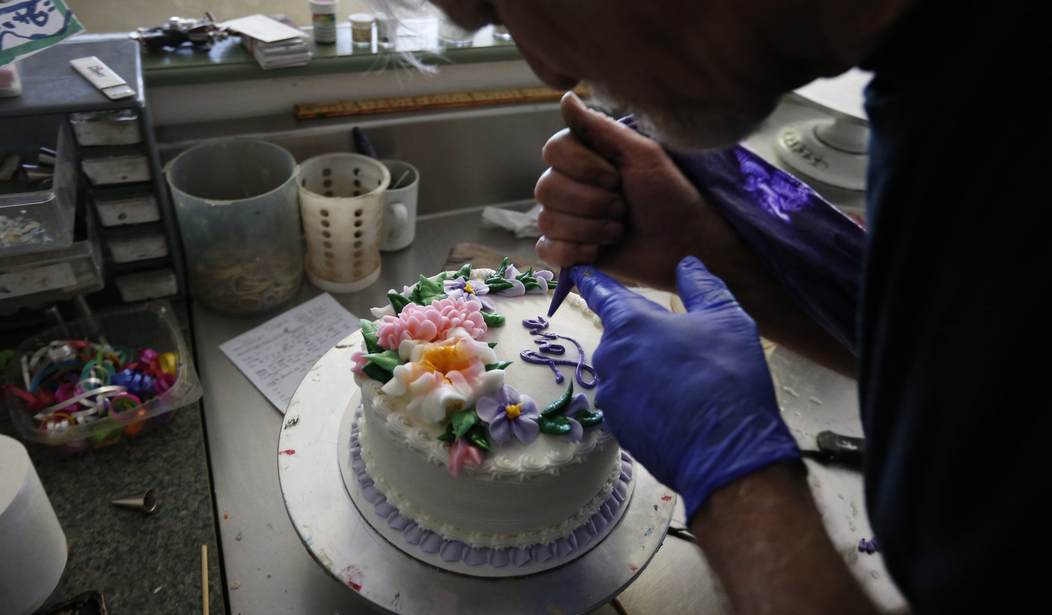WASHINGTON – A group of business owners who have made national headlines for refusing to serve same-sex weddings and events defended their actions on Wednesday as the Supreme Court prepares for a major case pitting religious freedom against gay rights.
The Supreme Court in June announced that it would consider the case of Colorado baker Jack Phillips, a Christian who refused to bake a cake for a same-sex wedding due to his religious beliefs. Phillips’ case could have major implications for Barronelle Stutzman, a Washington florist who refused to sell flowers to a longtime customer for his same-sex wedding.
The high court is currently deciding whether to hear Stutzman’s case, which was brought in lawsuits by the Washington attorney general and the ACLU. Oral arguments for Phillips’ case are expected in late November or early December, and a potential ruling could come in June.
“To create something that would go totally against my faith, which teaches me that marriage is between a man and a woman and Christ’s relationship with his church, that’s something that we cannot do,” Stutzman said Wednesday at the Heritage Foundation, noting that she will lose her entire life savings and business, Arlene’s Flowers, if she loses her case. The Washington State Supreme Court in a unanimous decision in February upheld fines against Stutzman for her actions, citing a state law that prohibits discrimination due to sexual orientation.
Stutzman had been serving the customer, Robert Ingersoll, for nine years prior to the lawsuit. When he told her about the wedding, she refused, citing her Christian beliefs and recommending three other florists. Ingersoll left, according to Stutzman, accepting the refusal, but his partner, Curt Freed, posted a message on Facebook, which went viral and prompted the Washington attorney general and the ACLU to get involved. The ACLU has argued that while religious freedom is a fundamental right, it doesn’t allow businesses to ignore the law or discriminate against homosexuals.
“We weren’t seeking her blessing, only an elegant display that would complement the beachy theme we wanted for our wedding,” Freed and Ingersoll wrote in the Seattle Times. “…We were reminded how discrimination works: Individuals are categorized, depersonalized, labeled.”
“I would be so excited if Rob came into my store,” Stutzman said. “I would wait on him another 10 years. I would hug him and catch up on his life. He is missed.”
Phillips opened Masterpiece Cakeshop in Lakewood, Colo., in 1993, he explained, to “create my art, do the baking that I love and serve the God that I love in ways that would hopefully honor him.” He noted that after he denied the same-sex couple in person, he received numerous calls and emails from anonymous individuals, one who threatened to shoot him in the head. He said that his shop doesn’t refuse same-sex couples, but does not bake cakes for weddings because his conscience wouldn’t feel right promoting the event.
“The wedding signifies husband and wife uniting with Christ,” Phillips said.
The Colorado Civil Rights Commission ruled that Phillips cannot refuse the business of same-sex couples, even for weddings. Rather than comply, Phillips eliminated his company’s wedding services, which meant a 40 percent loss in business and the firing of six of 10 employees. Other requests that Phillips has denied include a bachelor party cake and a divorce cake, which the customer wanted cut in half in celebration.
Carl and Angel Larsen, Christian owners of Telescope Media, a Minnesota video production company, have filed suit challenging the Minnesota Human Rights Act, a state law that bans discrimination based on race, national origin, color, sex, sexual orientation or disability. Carl Larsen explained that if they were to enter the wedding market with the intent of refusing same-sex events, they would be subject to 90 days in jail, fines up to $25,000 and compensatory damages.
“To enter into that marketplace and hope that nothing happens would be foolish,” Larsen said, adding that he believes ignoring injustice is to participate. “I don’t want anyone to have this fear that if I say what I really believe and live according to my conviction and have those waits of jail time and fees and potentially losing everything; that’s not good for anyone.”
Blaine Adamson, the Christian owner of Kentucky print shop Hands on Originals, was the only business owner not involved with a wedding and the only one to win a victory at the state level. Earlier this year the Kentucky Court of Appeals ruled Adamson could refuse to print gay pride T-shirts, stating that his artistic expression through T-shirt making is covered under free speech laws. The Kentucky Supreme Court is deciding whether it will hear the case again. Adamson said he has turned down several requests for T-shirt designs because of his conscience: a pastor who wanted to print a shirt with the message “homosexuality is a sin”; biker women asking for a “Biker Bitches” print; strip club and violence themes; and a youth group that wanted a design with a bucket of chicken with Jesus on it.
“We’ll work with anyone, regardless of what their beliefs are. It’s about the message that we’re asking,” Adamson said.









Join the conversation as a VIP Member